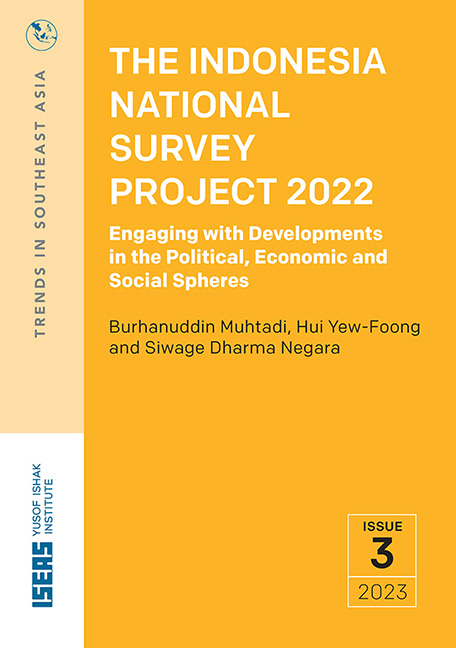 The Indonesia National Survey Project 2022
The Indonesia National Survey Project 2022 Published online by Cambridge University Press: 09 January 2024
Background of the Study
It has been more than two decades since the beginning of the Reformasi (Reform Movement) era marked by the fall of President Suharto. Experts are generally divided into two camps that hold sharply different views about Indonesia’s achievements during that period. The first scholarly camp holds a gloomier view, observing that the old corrupt political oligarchic forces have persisted in sabotaging the country’s democratic structural reforms, taking the country back to the practices of the New Order era when corruption, collusion and nepotism were the political and business order of the day. According to this group, there is hardly any significant difference between the New Order and Reform eras. Meanwhile, the other scholarly camp provides a rosier picture of the democratization process in Indonesia. Government officials have also repeatedly made claims that Indonesia has indeed taken big strides forward politically and economically since the end of the New Order.
But what is the public’s own perception of the reform achievements? We do not have information on public perceptions from the authoritarian era due to the political and academic restrictions on public opinion research at that time. What we can do is compare public opinion in the reform era from time to time to check how satisfied the public has been with ongoing developments in Indonesia. Moreover, in a democracy, public opinion surveys and the feedback they provide for public officials serve as one of the foremost methods for improving governance.
Back in 2017, the ISEAS – Yusof Ishak Institute (ISEAS) commissioned the Indonesian Survey Institute (LSI) to undertake the first Indonesia National Survey Project (known as the INSP2017), which collected data on the attitudes and behaviour of Indonesians with respect to key issues in the economic, socio-cultural and political spheres. In this latest INSP undertaken in 2022 (INSP2022), besides retaining questions that continue to be relevant to issues in the three main areas, we have also adopted new issues and fielded the corresponding questions. This nationwide survey was conducted through face-to-face interviews with 1,620 respondents across all 34 provinces of Indonesia, from 21 to 28 July 2022.
To save this book to your Kindle, first ensure [email protected] is added to your Approved Personal Document E-mail List under your Personal Document Settings on the Manage Your Content and Devices page of your Amazon account. Then enter the ‘name’ part of your Kindle email address below. Find out more about saving to your Kindle.
Note you can select to save to either the @free.kindle.com or @kindle.com variations. ‘@free.kindle.com’ emails are free but can only be saved to your device when it is connected to wi-fi. ‘@kindle.com’ emails can be delivered even when you are not connected to wi-fi, but note that service fees apply.
Find out more about the Kindle Personal Document Service.
To save content items to your account, please confirm that you agree to abide by our usage policies. If this is the first time you use this feature, you will be asked to authorise Cambridge Core to connect with your account. Find out more about saving content to Dropbox.
To save content items to your account, please confirm that you agree to abide by our usage policies. If this is the first time you use this feature, you will be asked to authorise Cambridge Core to connect with your account. Find out more about saving content to Google Drive.